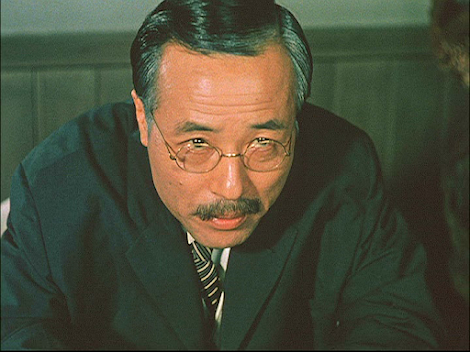Obscure Japanese Film #150
 |
| Hitomi Nozoe and Hiroshi Kawaguchi |
Kanazawa, central Japan, c.1920. Heiichiro (Hiroshi Kawaguchi) is a student who lives in a small first floor flat in the red light district with his widowed mother, Omitsu (Kinuyo Tanaka), who earns her living from needlework. Although once part of a wealthy family, they are now struggling to get by, and Heiichiro’s school fees are overdue.
One evening, a naïve country girl, Fuyuko (Kyoko Kagawa), is brought to the geisha brokerage downstairs by her uncle and sold. The broker (Kichijiro Ueda) intends to sell her on to a geisha house the next day, but not before he’s taken advantage of her himself. When he gets drunk and tries to rape Fuyuko, she flees the house and is taken in for the night by Omitsu. However, she has no choice but to return in the morning, when she is taken to the geisha house as planned and must prepare to learn her new trade. Omitsu is subsequently offered a job as a live-in seamstress at the same geisha house, so she and Heiichiro go to live there. Omitsu develops an affection for Heiichiro, but resigns herself to her fate, and is ordered by the head of the house (Kyu Sazanka) to sleep with local bigwig Amano (Shin Saburi).
Meanwhile, Heiichiro has a chance meeting with his former childhood sweetheart, Wakako (Hitomi Nozoe), and he falls in love when he sees her in a ridiculous Bo Peep bonnet and dress. She’s the daughter of a wealthy factory owner whose employees go on strike. One of these employees is a friend of Heiichiro’s, which leads to him being suspected of helping the strikers. Despite the efforts of a sympathetic teacher (Kinzo Shin), Heiichiro finds himself expelled from school by the headmaster (Eitaro Ozawa) …
On This Earth was adapted by Kaneto Shindo based on the first part of a long four-part autobiographical novel by Seijiro Shimada (1899-1930), whose life is closely reflected in the character of Heiichiro. Shimada was apparently something of an angry young man, and after his book was a huge success he was said to have become unbearably arrogant, which led to his early supporters dropping away and his success being a short-lived one. Shimada’s dissatisfaction with the state of the world and socialist beliefs are evident in the film – Shindo and director Kozaburo Yoshimura portray a society in which the vast majority accept its inherent injustice unquestioningly because the exploitative economic eco-system in which they must survive is so inflexible. If – like Heiichiro’s uncle (Taiji Tonoyama), who is in a position to help due to his job working for the council, but refuses to stick his neck out – they are lucky enough to have found themselves a niche, they dare not risk losing it. The filmmakers are obviously in sympathy with Shimada on this point, and make it pretty clear how they feel – for instance, a scene in which a female striker is dragged off screaming by the police cuts abruptly to a shot of fat cat Saburi enjoying himself in a geisha house.
Where the film is less successful is in the way that every female character in the film seems to conclude that Heiichiro is the best thing since sliced bread within a few seconds of meeting him. In fact, the character is mysteriously held in such high esteem by everyone that even Wakako’s brother (Keizo Kawasaki) encourages her love affair with Heiichiro against their parents’ wishes, and Fukai (Yosuke Irie), a mutual friend of Heiichiro and Wakako, who might have been expected to have feelings for Wakako himself, is only too willing to act as a go-between. It could well be that this assumed acceptance that Heiichiro is special without any apparent justification is also a weakness in the novel, which would make sense given Shimada’s reputation for arrogance, but in any case, I felt that it worked against the film.

Kyoko Kagawa and Kinuyo Tanaka
On This Earth benefits from a strong cast, but the story is nothing special and the cliché count is high. The main reason it remains worth watching in my opinion is the cinematography – the film was shot (much of it on location) using Daiei’s own colour process and was one of their last using the old academy ratio format, but it looks rather wonderfully like a moving painting.
Bonus trivia: This was the second film (after Masumura’s The Kiss) out of 21 to co-star Hiroshi Kawaguchi and Hitomi Nozoe. They married in 1960 and remained together until his death in 1987.
Thanks to kagetsuhisoka for the English subtitles, which can be found here.
Additional thanks to A.K.

























